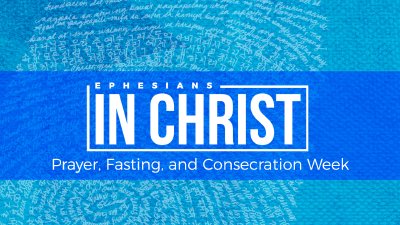Read Ephesians 1
“Blessed be the God and Father of our Lord Jesus Christ, who has blessed us in Christ with every spiritual blessing in the heavenly places . . .” — Ephesians 1:3
“I am in Christ.” Stop and ponder that for a while. Say it to yourself a few times, with varying emphasis. Savor the richness of this profound truth.
“In Christ” determines our new identity. Being in Christ not only redefines who we are, but it also supersedes all other possible definitions. Gender, culture, nationality, ethnicity, political affiliation—every label is secondary and subservient to our identity in Christ.
“In Christ” describes our spiritual position. We are united in Christ, beneficiaries of a new covenant that we did not deserve and cannot ever earn. We have legal right to claim all that is Christ’s as our own. And this inheritance is available for us today.
“In Christ” defines our current reality. All blessings of the Spirit, every good and pleasant thing he wants to bestow on us are already ours in Christ. His favor is not something we have to work for to receive.
“In Christ” recognizes our benefactor. In ourselves, we are helpless, wretched, with nothing to offer. But in Christ and only through Christ do we have life and all we need. No one who has experienced his fullness will ever choose to abide in anything or anyone else.
Apply:
1. List all of the spiritual blessings in Ephesians 1 that God has given to believers in Christ.
2. How does our identity in Christ affect the manner and confidence with which we should pray?
3. What one thing will you change today as a result of what the Holy Spirit has revealed to you through this study?
Pray:
*Pray to Know God Better*
“I do not cease to give thanks for you, remembering you in my prayers, that the God of our Lord Jesus Christ, the Father of glory, may give you the Spirit of wisdom and of revelation in the knowledge of him . . .” — Ephesians 1:16–17
Heavenly Father, thank you for opening the eyes of my heart so I may fully grasp the hope that is now mine in Christ. I understand that you have called me out of darkness into your marvelous light—you have called me to walk with you. May holiness and faithfulness mark my every step. Help me to remember that not only am I rich in you but that you see me as your prized inheritance. May your light shine through my life in a way that brings honor to your name. Be glorified in all I think, say, and do. All this I pray in Jesus’ mighty name. Amen.
“And Can It Be That I Should Gain”
Charles Wesley (1738)
And can it be that I should gain
An interest in the Savior’s blood
Died He for me, who caused His pain
For me, who Him to death pursued?
Amazing love! How can it be
That Thou, my God, shouldst die for me?
Amazing love! How can it be
That Thou, my God, shouldst die for me?
He left His Father’s throne above
So free, so infinite His grace
Emptied Himself of all but love
And bled for Adam’s helpless race
‘Tis mercy all, immense and free
For O my God, it found out me!
Amazing love! How can it be,
That Thou, my God, shoudlst die for me?
Long my imprisoned spirit lay,
Fast bound in sin and nature’s night
Thine eye diffused a quickening ray
I woke, the dungeon flamed with light
My chains fell off, my heart was free
I rose, went forth, and followed Thee
Amazing love! How can it be
That Thou, my God shouldst die for me?
No condemnation now I dread
Jesus, and all in Him, is mine
Alive in Him, my living Head
And clothed in righteousness divine
Bold I approach the eternal throne
And claim the crown, through Christ my own
Amazing love! How can it be
That Thou my God, shouldst die for me?

Before You Fast
In Christ
Ephesians 1
More from
In Christ







